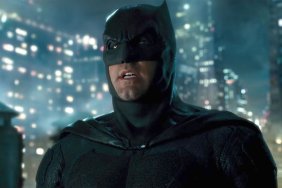Photo: Marvel Studios
It’s hard not to get excited when you hear of a famous director’s upcoming project. Correspondingly, when said director winds up either ditching or being removed from the project before it is completed (or in some cases, even begun), you can’t help but feel slighted for having gotten your hopes up in the first place. This goes doubly if the director is swapped out for some nobody. While most of the replacements on this list could hardly be considered “nobodies,” they certainly lacked the clout of their predecessors by comparison. For better or worse, here are 10 directors who got the job done when their more prominent counterparts stepped away.
Ant-Man (2015)

With comic book movies being as successful and high profile as they are these days, it was obviously noteworthy when Edgar Wright, famous for his Cornetto trilogy (Shaun of the Dead, Hot Fuzz and World’s End) and prior comic book adaptation Scott Pilgrim vs. the World, exited Marvel’s Ant-Man back in May 2014. This was particularly shocking due to the fact that he had been developing the project since 2006, two years before the first official MCU film “Iron Man” was released. Alas, the breakup between the director and Marvel Studios was cited as “creative differences” and he was soon replaced by Peyton Reed, who was previously best known for movies like Bring It On and Yes Man. Interestingly enough, a similar situation had happened to Reed in 2003 when he was attached to helm a Fantastic Four film with Fox. He would wind up being replaced by director Tim Story.
Superman II (1980)

Keeping things in the superhero wheelhouse for a little longer, we have another instance of a film planned out far in advance which lost its famous director during production. Richard Donner, who would go on to direct such classics as The Goonies, Lethal Weapon and Scrooged within a four-year span of each other, was roughly three-fourths of the way finished shooting Superman II when he had to begin post-production on the original film (they were shot back-to-back). However, instead of merely waiting for Donner to return and finish things up, the studio instead replaced him with A Hard Day’s Night director Richard Lester. While the decision appeared to be for budgetary purposes, it was almost counterintuitive since in order to get full directing credit, Lester had to shoot at least 51 percent of the film. This meant that much of the material Donner had already shot was redone. Hence, the reason there is also a “Richard Donner Cut” of the film floating around out there.
Brave (2012)

Pixar has become notorious for firing its original directors mid-production, but Brave in particular stands out for many reasons. First and foremost, it was supposed to be the first of the Pixar films to be directed by a woman. Sadly, even though the film’s first director Brenda Chapman was considered a pioneer in the field of female animators, she was let go roughly a year before the movie’s release. To make matters worse, not only was her dark and deeply personal take on the film replaced with more family-friendly fare, but she also had to wind up splitting the credit for the Oscar-winning film with replacement director Mark Andrews. Adding insult to injury, Chapman left Pixar to head Lucasfilm Animation. Guess what was acquired by Disney/Pixar shortly thereafter.
Maleficent (2014)

People were pretty excited for a live-action take on Sleeping Beauty villain Maleficent, especially when it was announced in 2011 that visionary director Tim Burton was loosely attached to make it. Heck, even Disney itself was so jonesed at the prospect of having Burton onboard that they hired his Alice in Wonderland screenwriter to helm this one, as well. Unfortunately, things on Burton’s end wound up falling through, as he went on to direct the 2012 flop Dark Shadows instead. He was replaced on Maleficent by his Alice in Wonderland production designer Robert Stromberg. If that’s not literally a downgrade, then we don’t know what it.
Interstellar (2014)

In using the phrase “lesser-known,” we knew there was bound to be some debate on the matter at some point. Enter Interstellar, which was directed by none other than Christopher Nolan of The Dark Knight Trilogy fame. Who could have possibly been previously attached to create this sci-fi epic who’s more famous than the man behind Batman’s 21st-century cinematic incarnation? Steven Spielberg was originally meant to take the reigns on the project, having been developing it alongside screenwriter Jonathan Nolan since 2006. However, when DreamWorks struck a distribution deal with Disney, Spielberg became unavailable. Therefore, a new director was needed. The brotherly connection between screenwriter and future director helped fill that void quite nicely.
Also: 10 Annoying Cases Of Hollywood Directors Casting Their Kids
The Snowman (pending release date)

When Martin Scorsese is throwing his hat in as director of a movie, you know that it will be worth however long it takes him to make it. (Let’s face the facts, he’s a busy guy.) So when one of his projects falls through, it can be a bit of a letdown. Luckily, that doesn’t appear to be the case for the upcoming adaptation of crime novel The Snowman by Jo Nesbø. While Scorsese may no longer be directing like he said he was back in 2011, the project is still in good hands now that Tinker Tailor Soldier Spy director Tomas Alfredson is on the job. Plus, Scorsese is still executive producing, so consider that a bonus.
Untitled Tupac Shakur Biopic (pending release date)

We swear this is the last film we’ll cover that hasn’t actually been released yet, but come on, we gotta keep things fresh. Once again, the basic story here is another matter of “creative differences,” but with a twist. The creative differences in this instance appear to boil down to a matter of integrity on the part of former director John Singleton, whose previous work includes Boyz n the Hood and Poetic Justice, the latter of which starred the late Tupac Shakur in the flesh. Upon his departure from the already long-delayed project in early April, which was supposed to begin shooting in June, Singleton has pointed the finger at Morgan Creek Productions, saying on Instagram, “How you gonna make a movie about a man when you suing his mother to get the rights to tell his story?! They have no true love 4 Pac so this movie will not be made with love!” He goes on to say that he plans to make a Tupac biopic of his own in the near future. In the meantime, the Morgan Creek version is set to begin filming this coming August or September with Devil in the Blue Dress director Carl Franklin now leading the charge.
Exorcist: The Beginning (2004)

Not to slander a production company with whom we have no business, but it appears Morgan Creek has a bit of a reputation for ineptness when it comes to their properties. At least, if these last two director replacement stories are to be believed. Long before the Tupac biopic was even in development, Morgan Creek hired famed director John Frankenheimer to helm a prequel to the 1973 horror classic The Exorcist, due to its rerelease having been a major success. Once Frankenheimer fell ill and died prior to completing shooting, however, they replaced him with Paul Schrader, who had famously written both Taxi Driver and Raging Bull. After spending $30 million to complete the film, Morgan Creek decided upon Schrader’s final cut that it wasn’t commercial enough, so they hired a new writer/director duo in the form of Alexi Graham and Renny Harlin, respectively, to give it another go. The new film cost $50 million and debuted to critical panning, only pulling in $78 million worldwide. Schrader’s version was released under the title of “Dominion: Prequel to the Exorcist” less than a year later, but both versions were so similar that it hardly seemed worth it.
The 13th Warrior (1999)

The 13th Warrior was a lot like Exorcist: The Beginning in that it had two competing directors, but there was a lot more bad blood between them by the time the film was released. John McTiernan, who was known at the time for directing Die Hard, was originally slated to direct an adaptation of the Michael Crichton novel Eaters of the Dead. However, once Disney saw what he had shot and test screenings were collectively negative, they brought in Crichton himself to clean things up. This didn’t sit well with McTiernan, as Crichton chopped up his version of the film so much that it was virtually unrecognizable, even replacing the original score by Graeme Revell with a new version by Jerry Goldsmith. Needless to say, the name of the film itself was eventually changed altogether, as well. Things got so ugly between the two that at one point each man was shooting their own version of the film’s ending on the same lot. Ultimately, Crichton was named replacement director for McTiernan, but the credits still remained the same, most likely due to that whole 51 percent rule we mentioned in the Superman II section.
Moneyball (2011)

This one was a mess from the get-go but somehow ended well, which is why it caps off our list. Originally planned as a documentary-style drama starring mostly actual ballplayers in 2009, it was dropped by Columbia Pictures just days before famed director Steven Soderbergh was to begin shooting. Producer Brad Pitt was also apparently not happy with the script even though it was written by Aaron Sorkin, and called in Academy Award-winning screenwriter Steve Zaillian to fix it. (Side note: Zaillian had originally written a draft of the script before Sorkin replaced him initially.) Once the script was in place, Pitt then hired Capote director Bennett Miller to get the film back on its feet. To say that he eventually got it to a good place would be an understatement, as it went on to be nominated for Best Picture at the Academy Awards.









